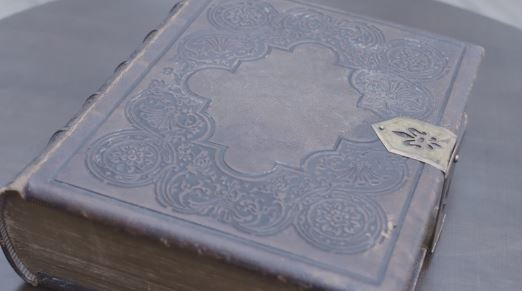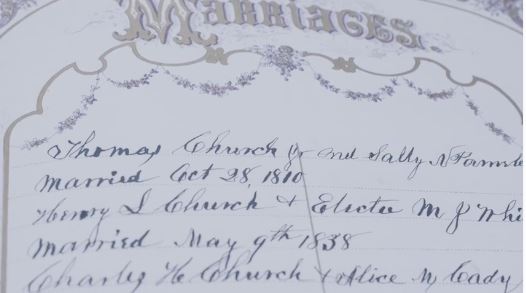How Facebook Users Reunited a Bible with its Family: Facebook for Family History
 These genealogy sleuths used Facebook for family history when they responded to a plea to help return a family Bible to its family.
These genealogy sleuths used Facebook for family history when they responded to a plea to help return a family Bible to its family.
Back on March 21, Donna Whitten posted a video on her church Facebook page. Her post says, “How far would you go to get back something you’ve lost?”
She was talking about a 150 year-old family Bible she’d come across while antiquing one day in Chattanooga, Tennessee. Her post says, “We want to find this family and return it to them! Can you help?” (Click here to see that post and video.)
 That video post got 34,000 views, thanks in part to more than 600 people who shared it! Family history fans immediately stepped up to the challenge. They looked for names on Ancestry.com and reached out to tree owners. Within two days, several descendants were aware of the Bible and asking for copies. The bible eventually went to a woman in California named Carrie Robinson, who has been researching her tree for several years. It contained obituaries clipped from newspapers and handwritten vital family events. (Wouldn’t you love to receive that kind of family treasure?) Click here to watch the follow-up video about when Donna took the bible to the new owner.
That video post got 34,000 views, thanks in part to more than 600 people who shared it! Family history fans immediately stepped up to the challenge. They looked for names on Ancestry.com and reached out to tree owners. Within two days, several descendants were aware of the Bible and asking for copies. The bible eventually went to a woman in California named Carrie Robinson, who has been researching her tree for several years. It contained obituaries clipped from newspapers and handwritten vital family events. (Wouldn’t you love to receive that kind of family treasure?) Click here to watch the follow-up video about when Donna took the bible to the new owner.
Hats off to Donna and her team of sleuths who took the time to find Carrie’s family and return their past to them! I find a few take-home messages in this story:
- Social media is a great way to cast your net wide, not just when you’re sharing family history, but when you’re looking for information. Click here to read more about gathering memories through Facebook.
- You can watch for orphaned heirlooms in your path and return them to descendants. Click here to read tips on how to do that.
- The video Donna created got attention on Facebook! Video is powerful. Use it to share your family history. (Full disclosure: This post contains affiliate links and I will be compensated if you make a purchase after clicking on my links. I appreciate you using these links because that compensation helps make the Genealogy Gems blog possible. Thank you!) Click here to read about Animoto, a DIY-video making service I love that lets you produce your own professional-quality videos. Below is one quick video I created. Can you say shareable?!






